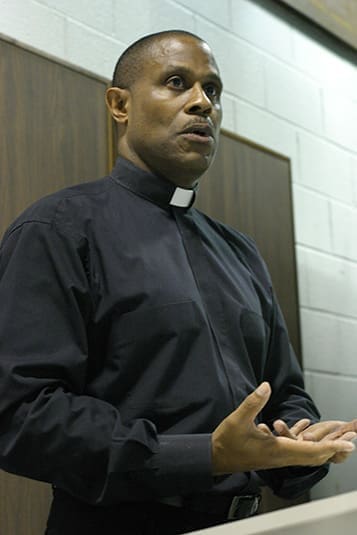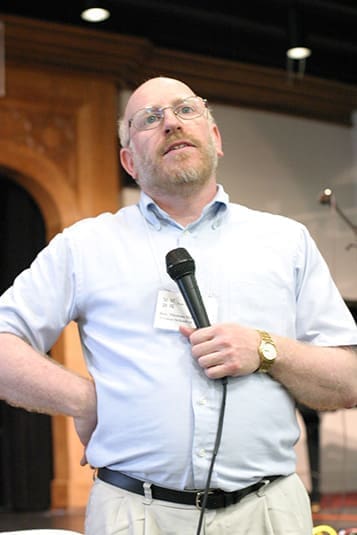Like faces of many in the Social Action Summer Institute audience, Ginger Cashin, a member of the Shrine of the Immaculate Conception, Atlanta, listens with disbelief as Nathalie Piraino, a survivor of the Rwandan genocide, shares her personal stories of loss and survival during the horrific period of racism and ethnic cleansing. Photo By Michael Alexander
Atlanta
Social Action Directors Meet To Revitalize Ministry
By ANDREW NELSON, Staff Writer | Published August 7, 2008
Catholic social justice leaders spent a week at Oglethorpe University studying coalition building with people of other faiths, digging into the church’s moral teachings and examining racism.
Father Bryan Massingale, a theology professor at Jesuit-run Marquette University in Milwaukee, said the Catholic Church has not been a beacon of racial justice in the United States, but has the tools to be an advocate for racial reconciliation.
“U.S. Catholics have not been immune to the racial virus that has infected American society. In fact, in many ways, we have aided and exacerbated it,” he said to a crowded room.
More than 200 Catholic leaders from across the country attended the 23rd annual Social Action Summer Institute starting on July 20. The six-day program focused on educating advocates on Catholic doctrine and implementing it in their home churches.
Frank McKinney, 61, advocates for workforce housing and legislative issues in the Diocese of Richmond, Va. McKinney said he was invited to the event.
“When you are invited, there’s always something that God has in store that is interesting,” McKinney said.
On the issue of race, McKinney said there seems to be a gap between the workshop discussions and what is preached from the pulpit. Too much concern is focused on not getting people upset about racial discussions, he said.
Father Massingale, who is writing a book about Rev. Dr. Martin Luther King’s teachings and links with Catholic social teaching, said the U.S. bishops have not been as forceful talking about race as they are on other pro-life issues, despite Pope John Paul II linking racial reconciliation to the pro-life movement, he said.

Father Bryan Massingale, a theology professor at Marquette University, Milwaukee, Wis., provides a talk on “The History and Development of Catholic Teaching on Race and Racism.” Photo By Michael Alexander
“It’s a lack of passion, a lack of priority,” he said, compared to the church’s anti-abortion stance. “Standing against racism is not a core component of Catholic identity,” said Father Massingale, a priest in the Archdiocese of Milwaukee.
However, Father Massingale said the church has the tools to be a voice for justice.
“We begin with hope. There’s nothing to decree from Mount Sinai that God said there must be racism in human society,” he said. “What human beings divide, break and separate, we can also heal, unite and restore with the help of God.”
A frank discussion about racism can cause people to squirm, said some people.
“It’s a dirty little thing we don’t talk about. To think this is part of the church is hurtful,” said James Satterthwaite, a campus minister for the Diocese of Richmond.
Precious Blood Father Clarence Williams, of Catholic Charities USA, said that’s what needs to be overcome.
“We’re in separate worlds,” said Father Williams, who spoke about building a pastoral response to racism.
Overall, he said the Catholic Church has earned a B-minus on matters of race. Bishops address racial issues with documents, but little is done to change behavior in parishes.
“We have those ‘don’t-talk’ rules,” he said.
Father Williams said the conversations about race are paralyzed when people are controlled by fears of looking ignorant and feeling guilty.
People need to approach the issue with “passion” and also “compassion,” said Father Williams, who is Catholic Charities’ senior director of racial equality and diversity initiatives. He is founder and director of the Institute for Recovery from Racisms. The organization’s Web site is www.racialsobriety.com.
“Feel guilty if you don’t respond (to new understanding.) But don’t feel guilty for history. You didn’t make the history,” he said.
According to the U.S. Conference of Catholic Bishops, there are approximately 69 million Catholics in the U.S. and 2.3 million are black. There are 1,300 parishes that are predominantly African-American, 75 with African-American pastors; approximately 250 priests, 300 sisters and 380 deacons are African-American.
Archbishop Wilton D. Gregory welcomed the group at the institute’s opening Mass.
“Catholic social teaching is a proud legacy that we hold and cherish,” he said.
“The work of promoting and defending human dignity has never been popular since it so often flies in the face of prevailing public opinions and attitudes. Nonetheless, it flows from our identity as Christ’s followers to work for justice for those who live on the margins of society as did Jesus himself,” he added.

Dominican Sister Barbara Reid, a New Testament professor at Catholic Theological Union, Chicago, Ill., said, ÒYou have to hold on to each other in the struggle for forgiveness and social justice.Ó Sister Reid was the presenter for a mini-course entitled the Biblical Concepts of Justice during the Social Action Summer Institute on the campus of Oglethorpe University, Atlanta. Photo By Michael Alexander
Archbishop Gregory said the church’s voice on social justice must include care for the environment.
“We are summoned to see the environment as a common treasure and a joint inheritance that we must preserve for those generations that will follow us. Our concern for the earth fits the parable paradigm quite appropriately since so many of Jesus’ parables begin with the things of nature and presume that there will be seeds and fields and plants and vineyards that are capable of producing a harvest tomorrow—whether ten-fold, or thirty-fold, or even a hundred-fold,” he said.
The event drew leaders active in economic development, legislative advocacy and charity work.
Claudia Burchfield, 32, works on peace and justice issues for the Diocese of Charlotte, N.C. In the western side of the state, where Catholics are less than 1 percent of population, the racial tension erupts between whites and Latinos, she said.
“It speaks to your heart that there’s a long way to go. We are not where we need to be, far, far from it. That’s the unfortunate part,” she said.
Susan Rezzonico, 42, the director of social concerns and public policy at the Diocese of Colorado Springs, Colo., was attending her second conference.
“It’s a hot issue,” she said. In Colorado, racial conflict shows up in discussions about Hispanic immigration, she said. Her goal is to understand issues surrounding racism from a Catholic perspective.
Along with daily Mass and prayer, participants listened to speakers about women and Islam, Catholics and elections, fighting poverty, among other topics.
A group piled into buses July 23 to visit grassroots workers helping evicted trailer park residents, activists fighting against discrimination and people advocating for the poor.
Oscar Cardenas, 30, executive director of the People of Hope, spoke in Athens about its efforts to open the state’s first resident-owned trailer park.
The group also spoke with Latino advocates at Georgia Latino Alliance for Human Rights; heard from the Economic Justice Coalition, a group that promotes workers rights; and visited Our Lady of Lourdes Church, Atlanta, for a presentation by Atlantans Building Leadership for Empowerment, or ABLE, an ecumenical group working on health care, education and other issues. Each of the groups received financial assistance from the Catholic Campaign for Human Development, the domestic anti-poverty program of the U.S. Catholic bishops.
Susan Stevenot Sullivan, the director of parish and social justice ministries for Catholic Charities Atlanta, which organized the event, said a highlight for her was to see nearly 80 people from the Atlanta Archdiocese at the conference.
“Having so many local parishioners make the huge time and energy commitment to hear these theologians and other presenters share the ‘why’ and the ‘how to’ of the ‘concrete practice of love’ Pope Benedict speaks about in ‘Deus Caritas Est’ will be an amazing gift to the community of North Georgia,” she said in an e-mail.
The turnout was the second highest in the history of the program for this event which was held for the first time in the Southeast, Sullivan said. Advocates will take what they learned and enliven programs at local parishes, dioceses across the country and get engaged with advocacy, she said.
“I hope we will also see a greater awareness of the ecumenical and interfaith dimensions of loving and living with our neighbors,” she said.
U.S. bishops have issued three documents focused on race; the most recent was in 1979, “Brothers and Sisters to Us.” Individual bishops have written pastoral letters and the black Catholic bishops also addressed the issue, but Father Massingale talked about bishops as a group.

Jesuit priest Father Thomas Massaro, a professor of moral theology at Boston College’s School of Theology and Ministry, takes questions following his presentation on the “Foundations of Catholic Social Teaching.” Photo By Michael Alexander
Outlining the history of black Catholics with church leadership, Father Massingale said the church leaders since the 1930s have settled on the idea that resolving racial conflicts needed “courtesy, respect, decency,” instead of a “call for justice,” he said.
He said the church was late to the conversation as the country wrestled with race issues in the 1950s. It took American bishops four years to address the 1954 landmark Supreme Court decision outlawing legal segregation and then the response was vague, he said. Protestant churches did a much better job by outlining concrete plans, Father Massingale said.
The 1968 “The National Race Crisis” document called for action and recognized Catholic complacency, he said.
However, the issue isn’t with the Catholic faith, but with the American reception of the faith, Father Massingale said. There are core teachings on the issue, but the question is whether leaders have the will to use them, he said.
Pope John Paul II set a model with what he called a “purification of memory,” Father Massingale said. “You have to tell the truth of how you got where you are before you can move on,” he said.
He likened it to confession: telling the full truth before you can be reconciled.
In 1991, the Pontifical Council for Justice and Peace outlined steps to racial justice, including an apology for Catholic complicity in racism, the “right to reparations for racial injury,” solidarity in work for justice and recognizing the need for affirmative action.
In America, the past is baggage that people drop and move on, said Father Massingale. However, the Catholic heritage is to examine the past.
“If you want authentic reconciliation, you’ve got to begin with the hard acknowledgement of what happened to break the relationship,” he said.
Sponsors of the conference were: Roundtable, a national association of diocesan social action directors; the U.S. Conference of Catholic Bishops’ Department of Justice, Peace and Human Development; Catholic Relief Services; the Catholic Campaign for Human Development; Catholic Charities USA; and the Atlanta Archdiocese. Organizing the effort was Catholic Charities Atlanta parish and social justice ministries.